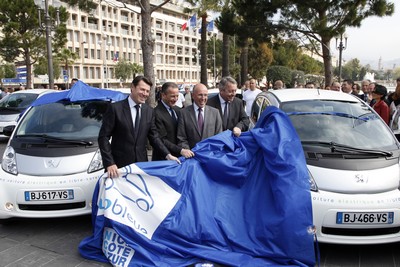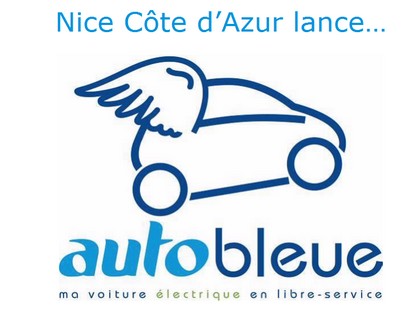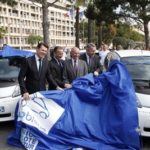On Saturday at Place Masséna, Deputy, Mayor of Nice, President of Nice Côte d’Azur Christian Estrosi, in the presence of Eric Ciotti, Deputy, President of the General Council of Alpes-Maritimes, Henri Proglio, Chairman and CEO of EDF, and Antoine Frérot, Chairman and CEO of Veolia Environnement, unveiled the first Autobleues, electric vehicles ready to revolutionize the population’s travel habits for moving freely.
 A first in France…
A first in France…
Starting Saturday, April 9, 2011, Nice Côte d’Azur will be the first community in France to implement, on a large scale, a Car Sharing system exclusively with electric cars. Across the Nice Côte d’Azur territory, 210 electric vehicles will eventually be spread over 70 stations.
The priority of Nice Côte d’Azur in terms of transportation is to promote soft modes of transportation or those using clean energy. The Communauté Urbaine Nice Côte d’Azur thus affirms its will to become a reference territory, reflecting the national challenge of a society reorganizing around the theme of sustainable development.
The Autobleue project…
Starting this Saturday, April 9, 2011, Nice Côte d’Azur will be the first community in France to implement, at this scale, car sharing exclusively with electric cars. Across the Nice Côte d’Azur territory, 210 electric car sharing vehicles will eventually be spread over 70 stations.
Each station has 5 spaces, including 2 reserved for owners of electric vehicles. This setup allows individuals, especially those without a garage, to access an urban point for electric charging. Similarly, public parking lots in Nice will gradually be equipped with charging points for electric vehicles.
Green electricity
The electricity used will be “green”: the delegate VENAP has subscribed to Balance Certificates with “EDF Collectivités Territoriales,” ensuring that the consumption of the autobleues will be entirely offset by electricity produced from renewable energy sources (primarily hydropower).
Taking into account the complete energy chain (“from well to wheel” as specialists say), 1 km in an Autobleue produces 8 grams of CO², whereas the average for French petrol cars is 158 grams of CO² per km, which is 20 times more.
Overall, the Autobleue system will consume only a negligible part of the electricity currently distributed in the Nice area. Once fully deployed and in full commercial operation, it will represent (choose your metric):
- The consumption of 80 Nice households,
- A third of the public lighting on the Promenade des Anglais alone,
-
30 times less than the public lighting of the city of Nice alone,
-
0.1% of the total electricity distributed in Alpes-Maritimes.
In terms of “called power” (in relation to the blackout risk), even charging all 210 autobleues together would only account for 0.5% of the winter peak in the Alpes-Maritimes department. In any case, the autobleues’ charging system is designed to be automatically limited or shed in case of network difficulties.
Everything has been perfectly studied to be consistent with the policy of optimizing the electrical system in our territory.
Project presentation and timeline
From launch, a rapid deployment of vehicles and stations
48 cars and 16 stations in service at the beginning of April 2011 (14 in Nice; 1 in Cagnes sur Mer, 1 in Saint-Laurent-du-Var). Including an offer of 10 Citroën Berlingo powered by Venturi and 41 Peugeot iOns.
Summer 2011: Commissioning of 39 Mia by Heuliez,
End of 2011: 132 vehicles and 44 stations will be in service, comprising
- 61 Peugeot IONs,
- 10 Citroën Berlingo Venturis,
- 58 Mia by Heuliez,
End of 2012: 210 vehicles and 70 stations will be in service; if new models are available, NCA will broaden the range of vehicles provided.
Amount of public investment
Nice Côte d’Azur will contribute to the development of the 70 stations at the rate of €40,000 each, totaling €2,800,000, half of which will be covered by the state since Nice Côte d’Azur is one of the 12 projects selected by the state to experiment with this system. Nice Côte d’Azur will also provide an operating subsidy to the delegate, which will decrease over time based on commercial revenue. This voluntarism is necessary to support the evolution of mentalities: encouraging people to favor soft modes of transport.
Cost to the Urban Community: €1.4 million/year



